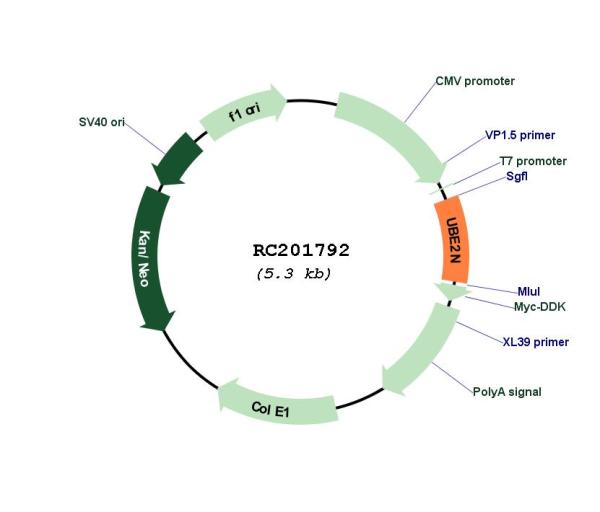UBE2N (NM_003348) Human Tagged ORF Clone
CAT#: RC201792
- TrueORF®
UBE2N (Myc-DDK-tagged)-Human ubiquitin-conjugating enzyme E2N (UBE2N)
ORF Plasmid: tGFP
Lentiviral Particles: DDK DDK w/ Puro mGFP mGFP w/ Puro
AAV Particle: DDK
"NM_003348" in other vectors (6)
USD 198.00
Specifications
| Product Data | |
| Type | Human Tagged ORF Clone |
| Tag | Myc-DDK |
| Symbol | UBE2N |
| Synonyms | HEL-S-71; UBC13; UbcH-ben; UbcH13; UBCHBEN |
| Vector | pCMV6-Entry |
| E. coli Selection | Kanamycin (25 ug/mL) |
| Mammalian Cell Selection | Neomycin |
| Sequence Data |
>RC201792 ORF sequence
Red=Cloning site Blue=ORF Green=Tags(s) TTTTGTAATACGACTCACTATAGGGCGGCCGGGAATTCGTCGACTGGATCCGGTACCGAGGAGATCTGCC GCCGCGATCGCC ATGGCCGGGCTGCCCCGCAGGATCATCAAGGAAACCCAGCGTTTGCTGGCAGAACCAGTTCCTGGCATCA AAGCCGAACCAGATGAGAGCAACGCCCGTTATTTTCATGTGGTCATTGCTGGCCCTCAGGATTCCCCCTT TGAGGGAGGGACTTTTAAACTTGAACTATTCCTTCCAGAAGAATACCCAATGGCAGCCCCTAAAGTACGT TTCATGACCAAAATTTATCATCCTAATGTAGACAAGTTGGGAAGAATATGTTTAGATATTTTGAAAGATA AGTGGTCCCCAGCACTGCAGATCCGCACAGTTCTGCTATCGATCCAGGCCTTGTTAAGTGCTCCCAATCC AGATGATCCATTAGCAAATGATGTAGCGGAGCAGTGGAAGACCAACGAAGCCCAAGCCATAGAAACAGCT AGAGCATGGACTAGGCTATATGCCATGAATAATATT ACGCGTACGCGGCCGCTCGAGCAGAAACTCATCTCAGAAGAGGATCTGGCAGCAAATGATATCCTGGATT ACAAGGATGACGACGATAAGGTTTAA >RC201792 protein sequence
Red=Cloning site Green=Tags(s) MAGLPRRIIKETQRLLAEPVPGIKAEPDESNARYFHVVIAGPQDSPFEGGTFKLELFLPEEYPMAAPKVR FMTKIYHPNVDKLGRICLDILKDKWSPALQIRTVLLSIQALLSAPNPDDPLANDVAEQWKTNEAQAIETA RAWTRLYAMNNI TRTRPLEQKLISEEDLAANDILDYKDDDDKV |
| Chromatograms |
CHROMATOGRAMS
 Sequencher program is needed, download here. |
| Restriction Sites |
SgfI-MluI
Cloning Scheme for this gene
Plasmid Map

|
| ACCN | NM_003348 |
| ORF Size | 456 bp |
| OTI Disclaimer | The molecular sequence of this clone aligns with the gene accession number as a point of reference only. However, individual transcript sequences of the same gene can differ through naturally occurring variations (e.g. polymorphisms), each with its own valid existence. This clone is substantially in agreement with the reference, but a complete review of all prevailing variants is recommended prior to use. More info |
| OTI Annotation | This clone was engineered to express the complete ORF with an expression tag. Expression varies depending on the nature of the gene. |
| Product Components | The ORF clone is ion-exchange column purified and shipped in a 2D barcoded Matrix tube containing 10ug of transfection-ready, dried plasmid DNA (reconstitute with 100 ul of water). |
| Reconstitution | 1. Centrifuge at 5,000xg for 5min. 2. Carefully open the tube and add 100ul of sterile water to dissolve the DNA. 3. Close the tube and incubate for 10 minutes at room temperature. 4. Briefly vortex the tube and then do a quick spin (less than 5000xg) to concentrate the liquid at the bottom. 5. Store the suspended plasmid at -20°C. The DNA is stable for at least one year from date of shipping when stored at -20°C. |
| Reference Data | |
| RefSeq | NM_003348.4 |
| RefSeq Size | 2568 bp |
| RefSeq ORF | 459 bp |
| Locus ID | 7334 |
| UniProt ID | P61088 |
| Cytogenetics | 12q22 |
| Domains | UBCc |
| Protein Families | Druggable Genome |
| Protein Pathways | Ubiquitin mediated proteolysis |
| MW | 17.1 kDa |
| Gene Summary | The modification of proteins with ubiquitin is an important cellular mechanism for targeting abnormal or short-lived proteins for degradation. Ubiquitination involves at least three classes of enzymes: ubiquitin-activating enzymes, or E1s, ubiquitin-conjugating enzymes, or E2s, and ubiquitin-protein ligases, or E3s. This gene encodes a member of the E2 ubiquitin-conjugating enzyme family. Studies in mouse suggest that this protein plays a role in DNA postreplication repair. [provided by RefSeq, Jul 2008] |
Documents
| Product Manuals |
| FAQs |
| SDS |
Resources
Other Versions
| SKU | Description | Size | Price |
|---|---|---|---|
| RC201792L1 | Lenti ORF clone of Human ubiquitin-conjugating enzyme E2N (UBE2N), Myc-DDK-tagged |
USD 450.00 |
|
| RC201792L2 | Lenti ORF clone of Human ubiquitin-conjugating enzyme E2N (UBE2N), mGFP tagged |
USD 450.00 |
|
| RC201792L3 | Lenti ORF clone of Human ubiquitin-conjugating enzyme E2N (UBE2N), Myc-DDK-tagged |
USD 450.00 |
|
| RC201792L4 | Lenti ORF clone of Human ubiquitin-conjugating enzyme E2N (UBE2N), mGFP tagged |
USD 450.00 |
|
| RG201792 | UBE2N (tGFP-tagged) - Human ubiquitin-conjugating enzyme E2N (UBE2N) |
USD 350.00 |
|
| SC111050 | UBE2N (untagged)-Human ubiquitin-conjugating enzyme E2N (UBE2N) |
USD 150.00 |
{0} Product Review(s)
Be the first one to submit a review






























































































































































































































































 Germany
Germany
 Japan
Japan
 United Kingdom
United Kingdom
 China
China




